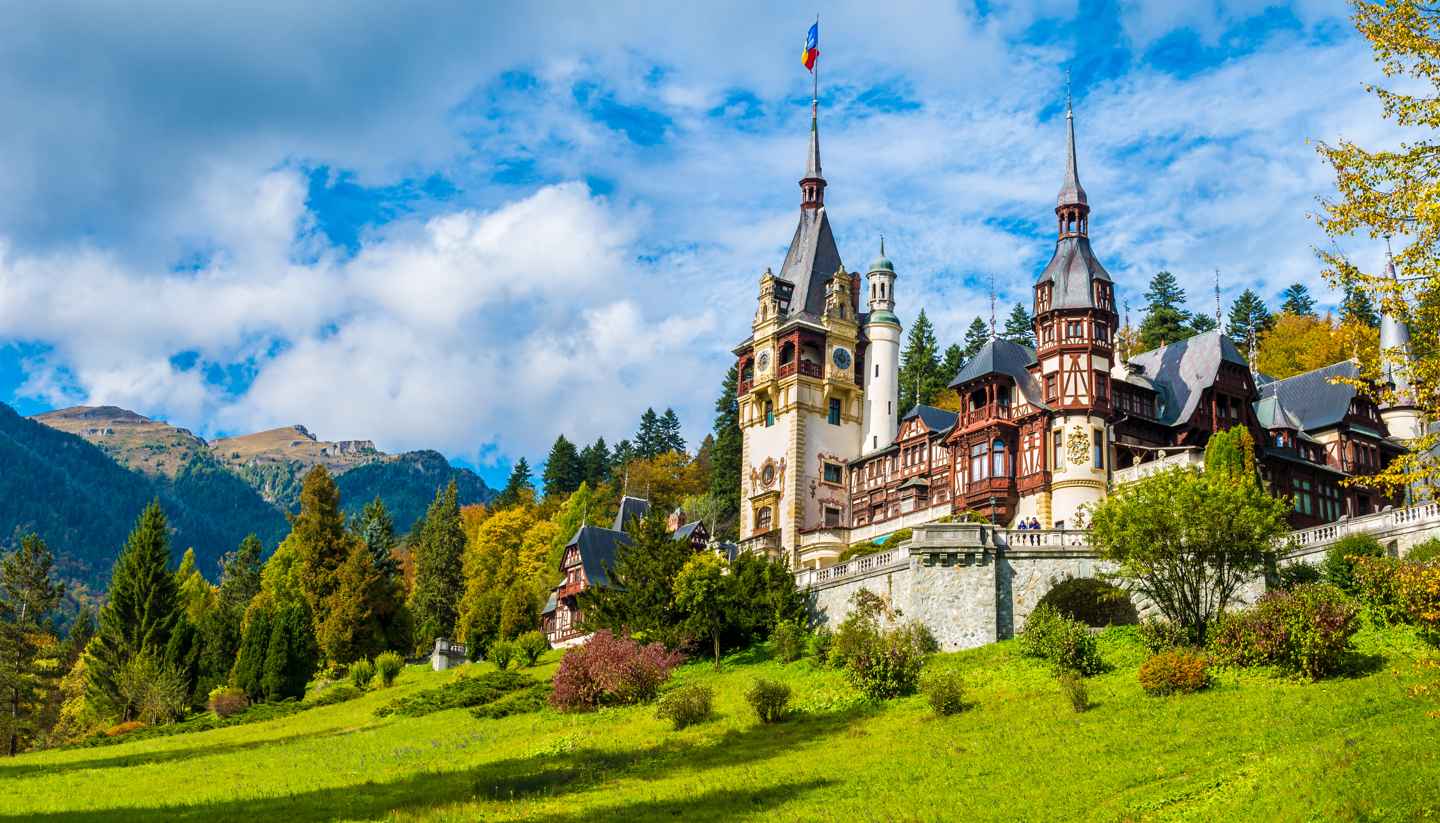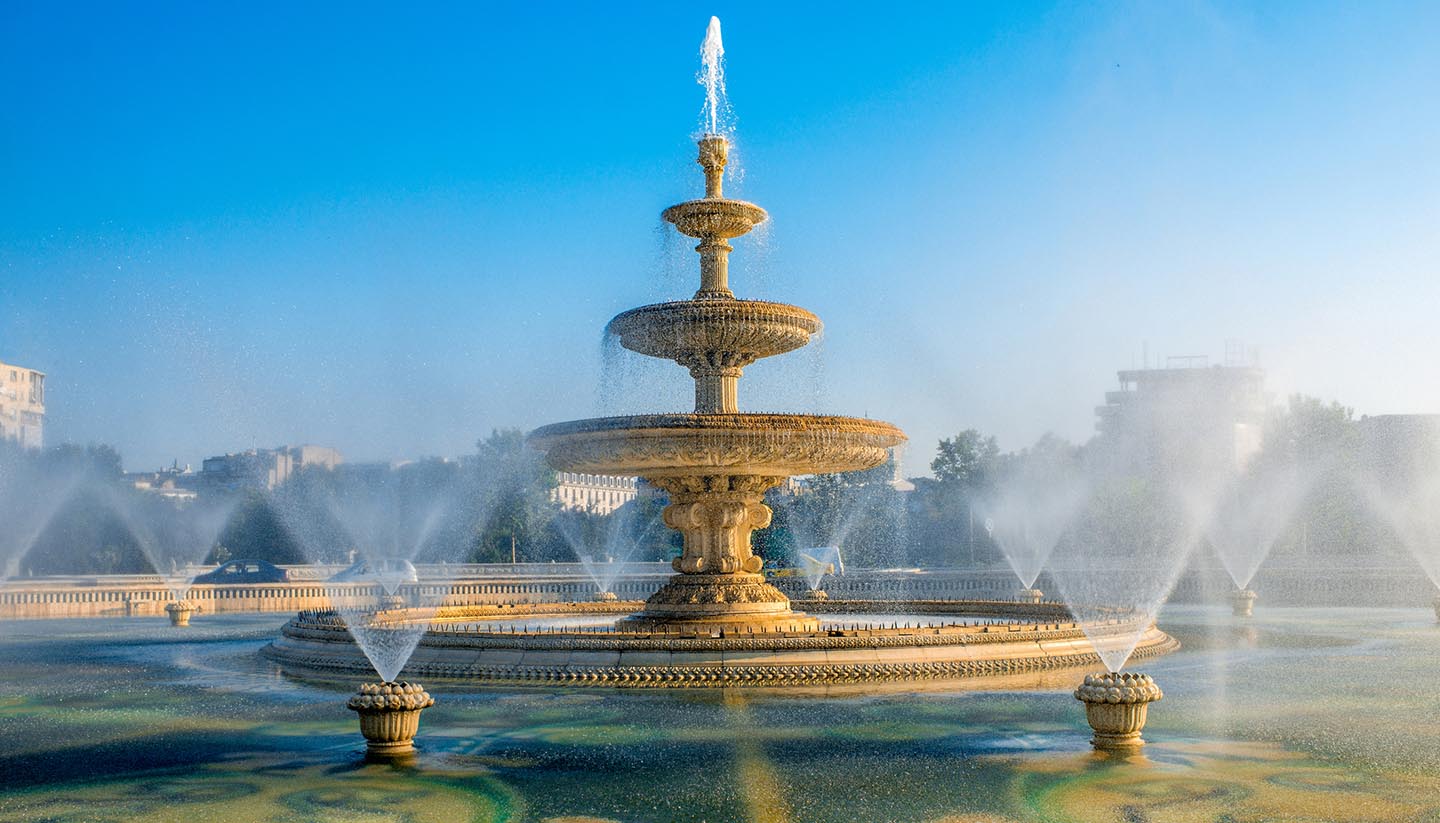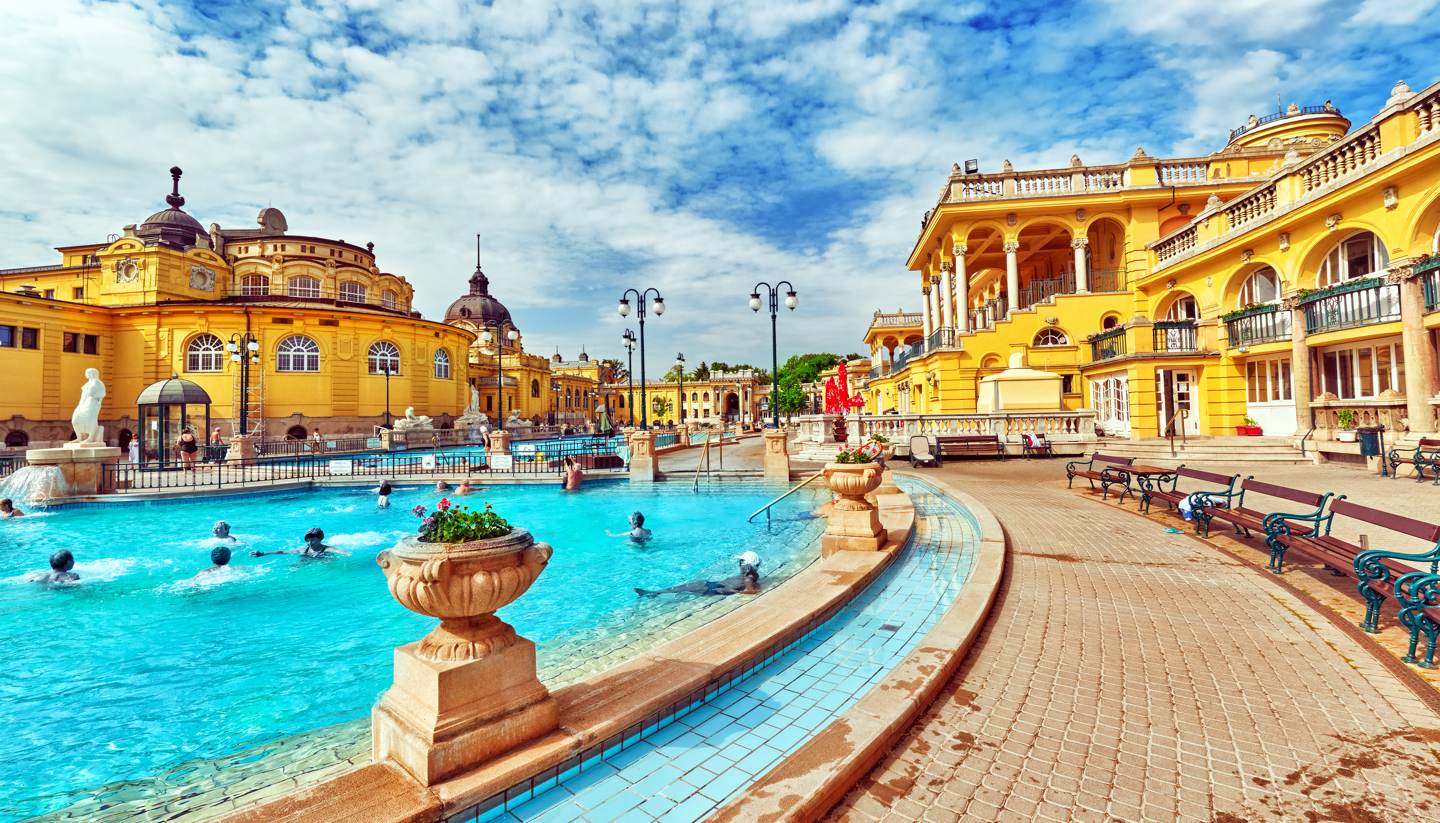Romania travel guide
About Romania
Romania has a rich cultural and natural diversity. Its dramatic mountain scenery includes the densely forested Carpathian Mountains, picturesque valleys and miles of fine white sandy beaches on the Black Sea Coast.
The first post of call for most travellers is the bustling capital, Bucharest, which was once known as ‘Little Paris’ due to its sophisticated charm. Crammed with grand architecture, fascinating museums and traditional restaurants, it’s well worth a few days exploration. So too are the resorts along the Black Sea Coast, which surprise many with their stunning sandy beaches and ocean panoramas.
Ultimately, though, Romania remains defined by its small, rural communities, many of which still depend on ancient agricultural practices. From the isolated villages clinging to the Carpathian Mountains to the Saxon towns of Transylvania, a tour of Romania’s backcountry will uncover traditional ways of life and a treasure chest of cultural gems.
It is, of course, practically illegal to talk about Transylvania without mentioning the legend of Dracula. The Romanians are all too well aware of the interest in Bram Stoker’s fictional vampire and the castle at Bran (supposedly the spot that inspired Stoker’s story) has been transformed into one of the country’s top tourist attractions.
Elsewhere the forests covering the Carpathian Mountains shelter some of Europe's last remaining brown bears, wolves and lynxes, while racoon dogs and rare muskrats gather around the rivers.
While Romania offers travellers the chance to immerse themselves in a defiantly traditional way of life, that isn’t to say the locals don’t appreciate their creature comforts. The natural spas scattered across the country purport to cure everything from rheumatism to heart disease, and make a luxurious finale to any Romanian adventure.
Key facts
238,391 sq km (92,043 sq miles).
19,372,734 (UN estimate 2016).
90.9 per sq km.
Bucharest.
Republic.
President Klaus Iohannis since 2014.
Prime Minister Marcel Ciolacu since June 2023.
Travel Advice
The Foreign, Commonwealth & Development Office (FCDO) provides advice about risks of travel to help British nationals make informed decisions. Find out more about FCDO travel advice.
Before you travel
No travel can be guaranteed safe. Read all the advice in this guide as well as support for British nationals abroad which includes:
- advice on preparing for travel abroad and reducing risks
- information for women, LGBT+ and disabled travellers
Follow and contact FCDO travel on Twitter, Facebook and Instagram. You can also sign up to get email notifications when this advice is updated.
Travel insurance
If you choose to travel, research your destinations and get appropriate travel insurance. Insurance should cover your itinerary, planned activities and expenses in an emergency.
This advice reflects the UK government’s understanding of current rules for people travelling on a full ‘British citizen’ passport from the UK, for the most common types of travel.
The authorities in Romania set and enforce entry rules. If you’re not sure how these requirements apply to you, contact Romania’s Embassy in the UK.
COVID-19 rules
There are no COVID-19 testing or vaccination requirements for travellers entering Romania.
Passport validity requirements
Romania is now part of the Schengen area, you must follow the Schengen area passport requirements to travel there.
To enter Romania (and all Schengen countries) your passport must:
- have a ‘date of issue’ less than 10 years before the date you arrive. Passports issued after 1 October 2018 are now valid for only 10 years, but for passports issued before 1 October 2018, extra months may have been added if you renewed a passport early
- have an ‘expiry date’ at least 3 months after the day you plan to leave
Check the Ministry of Foreign Affairs for the latest guidance on passport validity.
Contact the Romanian embassy in the UK if you think that your passport does not meet both these requirements. Renew your passport if you need to.
Passport stamping
At the Romanian border your passport may be stamped when you enter and exit Romania or another country in the Schengen area. Border guards will use passport stamps to check you have not overstayed the 90-day visa-free limit for short stays in the Schengen area.
You can show tickets or boarding passes as evidence of when and where you entered or exited the Schengen area. Ask the border guards to add this date and location in your passport.
If you have a Withdrawal Agreement residency document for another country, your passport might still be stamped if you are a visitor to Romania.
You may also need to:
- show a return or onward ticket
- show you have enough money for your stay
Read about passport stamping if you live in Romania.
Visa requirements
Romania is now part of the Schengen area. Visits to Romania now count towards your 90-day visa-free limit in the Schengen area.
You can visit the Schengen area for up to 90 days in any 180-day period without a visa. This applies if you travel:
- as a tourist
- to visit for family or friends
- to attend business meetings, cultural or sports events
- for short-term studies or training
On 31 March, Romania joined Schengen for border control-free travel via air and sea. Border controls will continue to remain at all land and river borders, including those within the Schengen zone. You will need to show your passport at land and river borders, although your passport should not be stamped.
Visits to any other Schengen countries in the 180 days before you travel to Romania will count towards your 90 day visa-free limit.
If you’re travelling to Romania (and all other Schengen countries) without a visa, make sure your whole visit to the Schengen area is within the 90-day limit.
To stay longer (to work or study, for business travel or for other reasons) you will need to meet the Romanian government’s entry requirements. Check with the Romanian Embassy in the UK what type of visa and/or work permit you may need.
Your passport must be valid for at least 6 months after the end date of the visa.
If you stay in Romania with a Romanian residence permit or long-stay visa, this time does not count towards your 90-day visa-free limit for travel to the Schengen area.
Vaccination requirements
At least 8 weeks before your trip, check the vaccinations and certificates you need in TravelHealthPro’s Romania guide.
Customs rules
There are strict rules about goods that you can take into or out of Romania (in Romanian). You must declare anything that may be prohibited or subject to tax or duty.
Leaving Romania with children aged 17 and under
If you’re travelling with a child who holds Romanian citizenship, and you are not the child’s parent, or you are a parent but the other parent is not travelling with you, you may need to show notarised parental consent.
A list of the public notaries can be found on the website of the National Union of Public Notaries of Romania.
Terrorism
There is a high threat of terrorist attack globally affecting UK interests and British nationals, including from groups and individuals who view the UK and British nationals as targets. You should remain vigilant at all times.
UK Counter Terrorism Policing has information and advice on staying safe abroad and what to do in the event of a terrorist attack. Find out how to reduce your risk from terrorism while abroad.
Terrorism in Romania
Terrorist attacks in Romania cannot be ruled out. Attacks could be indiscriminate, including in places visited by foreigners.
Political situation
There is widespread military activity in Ukraine. You should not attempt to cross into Ukraine from Romania. See Ukraine travel advice.
Crime
Protecting your belongings
Be alert to petty theft in large towns, especially Bucharest. Thieves use distraction techniques and organised attacks by groups can happen. Take care of your passport, money and personal belongings, particularly:
- near exchange shops and hotels
- on public transport, especially to the airport
- in main railway stations
- inside airport terminals
Credit or debit cards have been ‘copied’ when used for payment in some bars and restaurants.
Use a hotel safe for valuables where possible and carry a photocopy or scanned copy of your passport.
Organised crime
People-trafficking groups operate in the border areas.
Laws and cultural differences
Illegal drugs and prison sentences
The age of consent is 18. Romanian authorities treat all drug-related and sex offences very seriously. If convicted, you can expect a prison sentence.
Using cameras in secure areas
Most airports and military bases will have signs banning photography. If there could be sensitivity about taking pictures, ask permission.
LGBT+ travellers
Same-sex relationships are legal in Romania. There are active LGBT+ communities and events in Romania, though the majority of LGBT+ people are not openly gay. Find local information on LGBT+ issues in Romania and read more advice for LGBT+ travellers.
Transport risks
Road travel
You can use a UK photocard driving licence to drive in Romania. If you still have a paper driving licence, you may need to update it to a photocard licence or get the correct version of the International Driving Permit (IDP) as well.
If you are planning to drive in Romania, see information on driving abroad and read RAC’s Romania guide.
Hire car companies often have stricter requirements for their customers, such as a year of driving experience, minimum age and holding an IDP.
Driving a British car abroad
Make sure you have:
- your full, valid driving licence
- proof of insurance/green card (third party or above)
- proof of ID (passport)
- proof of ownership (V5C certificate)
You need a UK sticker to drive your car outside the UK. Since 2021, UK stickers have replaced GB stickers. Check the government guidance on displaying number plates for more information on what to do if you are driving outside the UK.
Check the driving requirements if you’re living in Romania.
Driving regulations
Carry a first aid kit, fire extinguisher, red warning triangle and a fluorescent jacket. You must have winter tyres from 1 November to 1 March.
You’ll need to pay a road toll ‘Rovinieta’ to use the national roads. Buy the vignette (sticker) at border points and at most petrol stations. If you do not display the sticker you may get a heavy fine. See Roviniete.ro for information, including prices.
It’s illegal to drive under the influence of alcohol. The drink-drive limit is zero.
If your vehicle is damaged before you arrive in Romania, ask a Romanian customs officer or police officer to write a report on the damage, so that you avoid any problems when leaving. If any damage happens inside the country, you must get a report at the scene of the accident.
Road safety
Road conditions are variable and secondary roads can be in a bad state of repair. Driving standards can be poor. Look out for:
- double-parked cars
- people suddenly braking to avoid a pothole
- horse-drawn carts, livestock and stray dogs in rural areas
Taxis
Most taxis in Bucharest should list prices on the side of the vehicle and display a company name. Foreign visitors can be overcharged by taxi drivers.
Extreme weather and natural disasters
Earthquakes
Romania is in a seismically active area and tremors happen regularly. The last major earthquake was in 1977.
See the US Federal Emergency Management Agency guidance about what to do before, during and after an earthquake.
Before you travel check that:
- your destination can provide the healthcare you may need
- you have appropriate travel insurance for local treatment or unexpected medical evacuation
This is particularly important if you have a health condition or are pregnant.
Emergency medical number
Dial 112 and ask for an ambulance.
Contact your insurance or medical assistance company promptly if you’re referred to a medical facility for treatment.
For more information read guidance on healthcare when travelling in Europe.
Vaccinations and health risks
At least 8 weeks before your trip check:
- the latest information on vaccinations and health risks in TravelHealthPro’s Romania guide
- where to get vaccines and whether you have to pay on the NHS travel vaccinations page
Medication
The legal status and regulation of some medicines prescribed or bought in the UK can be different in other countries.
Read best practice when travelling with medicines on TravelHealthPro.
The NHS has information on whether you can take your medicine abroad.
Healthcare facilities in Romania
FCDO has a list of English-speaking doctors in Romania.
Health insurance cards
Apply for a free UK Global Health Insurance Card (GHIC) or European Health Insurance Card (EHIC) before leaving the UK. If you already have an EHIC, it will still be valid as long as it remains in date.
The GHIC or EHIC entitles you to state-provided medical treatment necessary during your trip. Any treatment provided is on the same terms as Romanian nationals. If you do not have your card with you or you’ve lost it, contact the NHS Overseas Healthcare Team.
It’s important to take out appropriate travel insurance for your needs. A GHIC or EHIC is not an alternative to travel insurance and you should have both before you travel. A GHIC or EHIC does not cover all health-related costs, for example, medical repatriation, ongoing medical treatment and non-urgent treatment. Read more about what your travel insurance should cover.
GHIC and EHIC cover state healthcare only, not private treatment. You will be responsible for the cost of any treatment provided by a private doctor or private clinic.
Travel and mental health
Read FCDO guidance on travel and mental health. There is also mental health guidance on TravelHealthPro.
The Foreign, Commonwealth & Development Office (FCDO) cannot provide tailored advice for individual trips. Read this travel advice and carry out your own research before deciding whether to travel.
Emergency services in Romania
Telephone: 112 (ambulance, fire, police)
Contact your travel provider and insurer
Contact your travel provider and your insurer if you are involved in a serious incident or emergency abroad. They will tell you if they can help and what you need to do.
Refunds and changes to travel
For refunds or changes to travel, contact your travel provider. You may also be able to make a claim through insurance. However, insurers usually require you to talk to your travel provider first.
Find out more about changing or cancelling travel plans, including:
- where to get advice if you are in a dispute with a provider
- how to access previous versions of travel advice to support a claim
Support from FCDO
FCDO has guidance on staying safe and what to do if you need help or support abroad, including:
- finding English-speaking lawyers, funeral directors and translators and interpreters in Romania
- dealing with a death in Romania
- being arrested in Romania
- getting help if you’re a victim of crime
- what to do if you’re in hospital
- if you’re affected by a crisis, such as a terrorist attack
Contacting FCDO
Follow and contact FCDO travel on Twitter, Facebook and Instagram. You can also sign up to get email notifications when this travel advice is updated.
Help abroad in an emergency
If you are in Romania and you need emergency help from the UK government, contact the British Embassy Bucharest.
You can also contact FCDO online.
FCDO in London
You can call FCDO in London if you need urgent help because something has happened to a friend or relative abroad.
Telephone: 020 7008 5000 (24 hours)
Risk information for British companies
The Overseas Business Risk service offers information and advice for British companies operating overseas on how to manage political, economic, and business security-related risks.






